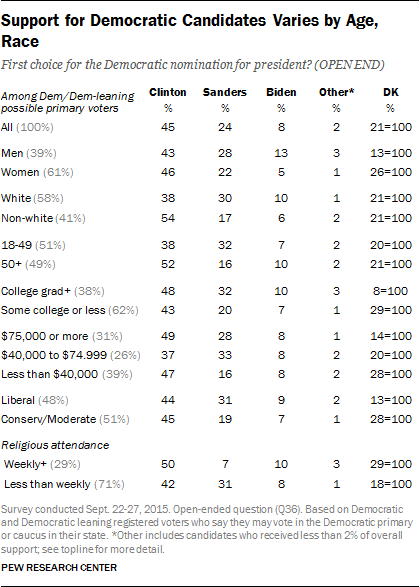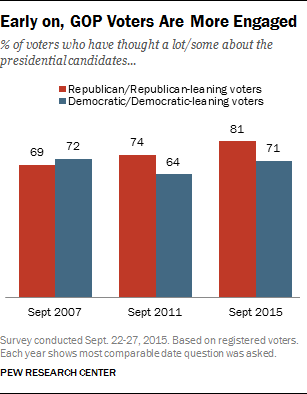(Note: There will not be a Sunday Cartoon post again this week. Wrongo and Ms. Right will be in Santa Barbara CA for our granddaughter’s college graduation. Blogging will resume on Tuesday, 6/14)
In 2008, the Republicans turned out a total of 20.8 million votes in 45 Primaries. In the 2016 primaries, the Republicans grew that total to 28.6 million votes.
The Democrats have 27.7 million primary votes in 2016, before the DC primary. When Clinton and Obama ran against each other in 2008, they had 37.4 million votes.
So the GOP is up 7.8 million votes or a 37.5% increase over 2008. The Democrats are down nearly 26% or, 9.7 million votes. The parties were separated by only 900,000 votes by the end of the 2016 primary season, and the GOP was on top.
The question to ask the pundits: What does the Republican increase in primary voter turnout by almost 8 million, and the Democrats’ vote shrinking by almost 10 million mean for the general election?
We could talk about the populist turn in 2016. The electorate is rebelling against the establishments of both parties. We could point to the insecurity about jobs, social security and pensions for the 98% of America who know these things are no longer certain in today’s America, and are even less certain in tomorrow’s America. These have made the Bernie promise of free education, Medicare for all, and a break-up of the banks very popular with Millennials. Trump has understood the economic fears of the white middle and lower classes, and has added fear of Muslims, fear of Mexican immigrants and a longing for a simpler world where America was unchallenged, and the 40-hour work week was nearly a right, to be the aspirational standard for tomorrow’s America.
We could talk about Hillary Clinton and the enthusiasm gap. In 2016, Hillary has garnered 15.7 million votes, and she will win the nomination. In 2008, she received 18.1 million votes, 2.4 million more than she got in 2016, and lost. This time around, she was not facing one of the best retail politicians of the last 100 years in Barack Obama, and no one thought that Bernie was real competition, until he was.
So, America is now at a point where, for the Pant Suit vs. the Pant Load, these numbers really begin to matter. Let’s remember that primary turnout doesn’t necessarily translate into a reliable indicator of the turnout in the general election.
Also, over half of the GOP turnout was for candidates other than Trump. Voter preference may change significantly for the general election.
This election will be true to previous form and will be decided in just a few states: Ohio, Florida, Michigan, North Carolina, Virginia and Pennsylvania will likely decide the outcome. Obama won all but NC in his 2012 race against Mitt Romney.
Assume that Hillary will win the majority of blacks, Hispanics, other ethnic minorities and many white women. The biggest question is: What percentage of women will vote for Hillary? If Trump peels off enough, he may be able to win in a few of those states.
So, turnout will be key. As an example, Charlie Crist would be the current governor of Florida if just 50% of the African American voters who were registered Democrats, had voted in the last gubernatorial election. In just in one (populous) Florida County.
The gap in the primary voting numbers are a good indicator that the GOP primary voters were more enthusiastic than were Democratic voters in 2016. However, the Democrats were very good at “Get out the Vote” programs in 2008 and 2012. Can Donald Trump match that in 2016?
Hillary starts with better odds of winning since the Democrats have an Electoral College advantage. Romney won 206 Electoral College votes. He lost Colorado, Florida, Ohio, Pennsylvania and Virginia each by between 150,000 and 250,000 votes. So, it’s conceivable that the enthusiasm for Trump in these states combined with less enthusiasm for Hillary could give him an Electoral College victory.
OTOH, Trump can’t change who he is. He’s not going to go toe to toe with Hillary on wonky policy details. So, he’ll continue the campaign that won him the primary in the general.
Will Pant Load fatigue set in? It hasn’t yet.


